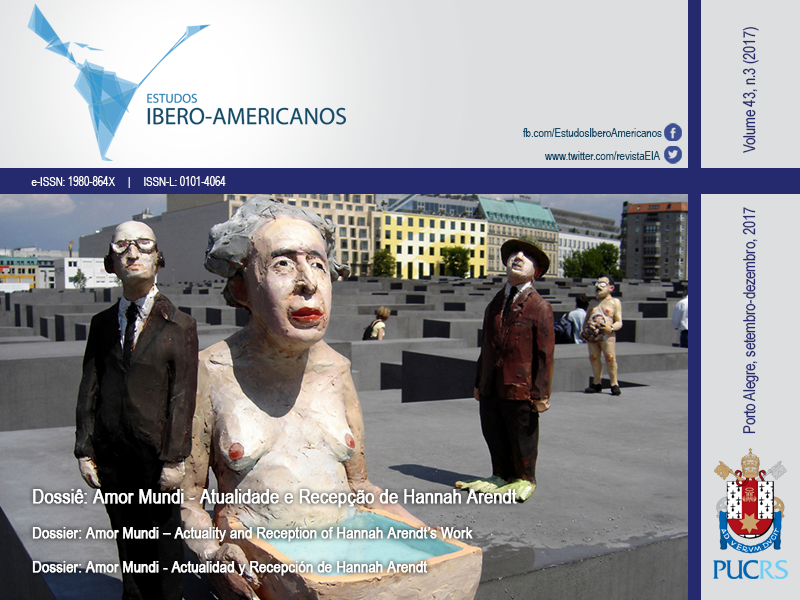“Crímenes que no se pueden punir ni perdonar” – Pensar con Hannah Arendt, en el debate sobre el pasado reciente en Argentina
DOI:
https://doi.org/10.15448/1980-864X.2017.3.25879Keywords:
Hannah Arendt, Evil, Banality, Forgiveness, Punishment.Abstract
***“Crimes that can’t be punished or forgiven” – Thinking with Hannah Arendt, in the debate about the recent past in Argentina***
The paper focuses on a sentence often repeated by Hannah Arendt, stating “crimes we can neither punish nor forgive”, and discusses the use made of this sentence in debates on recent history in Argentina, where it is repeated as a slogan which should make all thinking about forgiveness impossible. The paper tracks the different manifestations of this sentence through Arendt’s work, and argues that with the changes Arendt introduces in her reflection on evil, the way we should reflect on the relationship between evil, punishment and forgiveness ought to be modified as well.
Downloads
References
ARENDT, Hannah. The Image of Hell. Commentary, v. 2, n. 3, p.
-95, Sept. 1946.
ARENDT, Hannah. Understanding and politics. Partisan Review, 1953.
ARENDT, Hannah. The Human Condition. Chicago and London: The University of Chicago Press, 1958.
ARENDT, Hannah. Eichmann in Jerusalem. A report on the banality of evil. New York: The Viking Press, 1963.
ARENDT, Hannah. Tradition and the Modern Age. Partisan Review, 1954.
ARENDT, Hannah. Origins of Totalitarianism. (New edition with added prefaces). New York, San Diego and London: Harcourt Brace and Company, 1979.
ARENDT, Hannah. Hannah Arendt-Karl Jaspers Briefwechsel. München: Piper, 1985.
ARENDT, Hannah. On Revolution. New York: Penguin Books, 1990.
ARENDT, Hannah. Essays in Understanding. New York: Harcourt Brace and Company, 1994.
ARENDT, Hannah. Responsibility and Judgment. New York: Schocken Books, 2003.
ARENDT, Hannah. Diario filosófico 1950-1973. Barcelona: Herder, 2006.
BENHABIB, Seyla. Arendt’s Eichmann in Jerusalem. In: VILLA, Dana. The Cambridge Companion to Hannah Arendt. Santa Barbara (CAL): Cambridge U.P., 2000. p. 65-87.
BERNSTEIN, Richard. Did Hannah Arendt change her Mind? From Radical Evil to the Banality of Evil. In: MAY, Larry; KOHN, Jerome (Ed.). Hannah Arendt. Twenty Years Later. Cambridge (MASS.): The MIT Press, 1996. p. 127-146.
BIRULES, Fina. Unaherencia sin testamento: Hannah Arendt. Barcelona: Herder, 2007.
DERRIDA, Jacques. Le siècle et le pardon. Le Monde des Débats, Déc. 1999.
DI PEGO, Anabella. Política y filosofía en Hannah Arendt. El camino desde la comprensión hacia el juicio. Buenos Aires: Biblos, 2016.
FORTI, Simona. Banalità del male. In: PORTINARO, Pier Paolo (Ed.). Iconcetti del male. Torino: Einaudi, 2002. p. 30-52
Downloads
Published
How to Cite
Issue
Section
License
Copyright (c) 2017 Claudia Hilb

This work is licensed under a Creative Commons Attribution 4.0 International License.
Copyright
The submission of originals to Estudos Ibero-Americanos implies the transfer by the authors of the right for publication. Authors retain copyright and grant the journal right of first publication. If the authors wish to include the same data into another publication, they must cite Estudos Ibero-Americanos as the site of original publication.
Creative Commons License
Except where otherwise specified, material published in this journal is licensed under a Creative Commons Attribution 4.0 International license, which allows unrestricted use, distribution and reproduction in any medium, provided the original publication is correctly cited.






